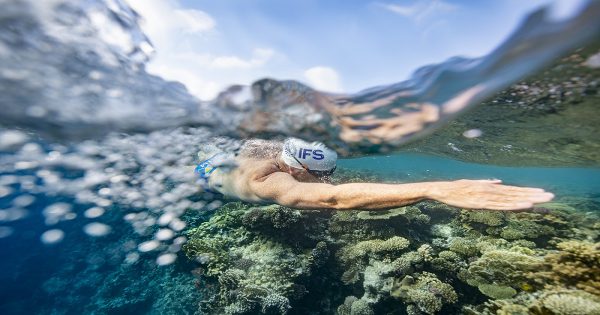IFS is a proud supporter of Lewis Pugh’s recent swim across the Red Sea, from Saudi Arabia to Egypt. Below, Pugh shares with us why he chose to complete this swim and his commitment to improving the Climate Crisis.
Stronger Together
Pioneering the first swim across the Red Sea, from Saudi Arabia to Egypt, was a lot more challenging than I expected.
I’m known for cold-water swims, so you’d think swimming in warmer water would be easier. But instead of dodging icebergs, I had to dodge container ships in the Gulf of Suez. Those ships are massive, and when they are bearing down on you at speed in the open water they are, frankly, quite terrifying.
The weather didn’t play nice either, with relentless sidewinds and waves, so that every stroke took the effort of ten. More than once I asked myself what I thought I was doing out there.
Red Sea Coral
Just as well that the beginning of the route had me swimming past the Ras Mohammed National Park. When I lifted my head to breathe, I saw arid desert stretching to the horizon. But when I looked down, I saw a kaleidoscope of vibrant life, with more colours than I have names to describe. I was looking at the most biologically diverse ecosystem on Earth.
Coral reefs are the nurseries of our oceans; they support 25% of all ocean life. But half the world’s coral reefs are believed to have died since the 1950s due to warming sea temperatures, combined with overfishing, pollution and reef disturbance. If we lose our coral reefs, we will not just drive many thousands of species into extinction, we will lose an entire ecosystem. This would be unprecedented in human history.
All coral is precious, but there is something extra special about Red Sea coral.
Researchers have found that the coral here is more resilient to warming and acidification. If global temperatures continue to rise as predicted, this Red Sea coral could be the last surviving coral on earth.
Every time I looked down, I was reminded of what I was swimming for: to highlight the vulnerability of coral reefs due to the accelerating Climate Crisis.

Powerful partnerships
It took me 16 long days to cover the 123 km between Tiran Island and Hurghada. But I didn’t have to do it alone.
I had always envisioned a gathering of swimmers from the region coming together to protect the Red Sea, so I was thrilled to be joined by swimmers from both Egypt and Saudi Arabia at various stages of the Red Sea Swim.
In the first few days, Dr Mariam Saleh Bin Laden, a pioneering open-water swimmer and passionate humanitarian from Saudi Arabia, joined me in the water. Mariam swam 9 km with me across the Strait of Tiran, becoming the first Arab, the first Saudi, and first woman to swim from Saudi Arabia to Egypt.
Egyptian swimmer Dr Mostafa Zaki was on board throughout the swim. He regularly jumped in to help me with pacing and extra motivation when the going got tough.
It takes a tight support team to pull together an expedition of this nature. It takes allies on the shore, and friends in the water. It also takes powerful partnerships; I couldn’t do my expeditions, and get my message out to the world, without sponsors like IFS, who understand the importance of working together to find innovative solutions to this Climate Crisis.
Every fraction of a degree matters
The timing of my swim was not coincidental. I swam past Sharm el-Sheikh, where world leaders are currently gathered for the UN Climate Summit COP27, where they will decide the fate of the world’s coral reefs.
Scientists warn that if we heat our planet by more than 1.5° C, we will lose 70% of the world’s coral reefs. If we heat it by 2°C, 99% of coral reefs will die. The latest figures put us on track for a 2.8°C increase. We just cannot let that happen.
On the opening day of COP27, UN Secretary-General António Guterres issued a stark warning: “We are in the fight of our lives, and we are losing… Our planet is fast approaching tipping points that will make climate chaos irreversible. We are on a highway to climate hell with our foot on the accelerator.”
Smart Cooperation
It’s time for all hands on deck, and it’s clear that business has a crucial role to play. Governments simply cannot tackle the Climate Crisis alone. Political interests too often lead to deadlock, or slow down decision-making. Businesses are much more nimble – and none more so than in the realm of digital solutions, which has the power to unleash exponential potential through smart cooperation.
As IFS Sustainability Ambassador, I know we have many technological solutions to address this Climate Crisis. What we need now is the kind of innovative forward thinking that companies like IFS can bring together. We need concrete action to galvanise political will. The citizens of our world, on the ground and in the water, are calling for it to happen.
We have no more time to waste; we have everything to lose.
And as the coral kept reminding me, we are all part of a wondrous world which we must fight for.